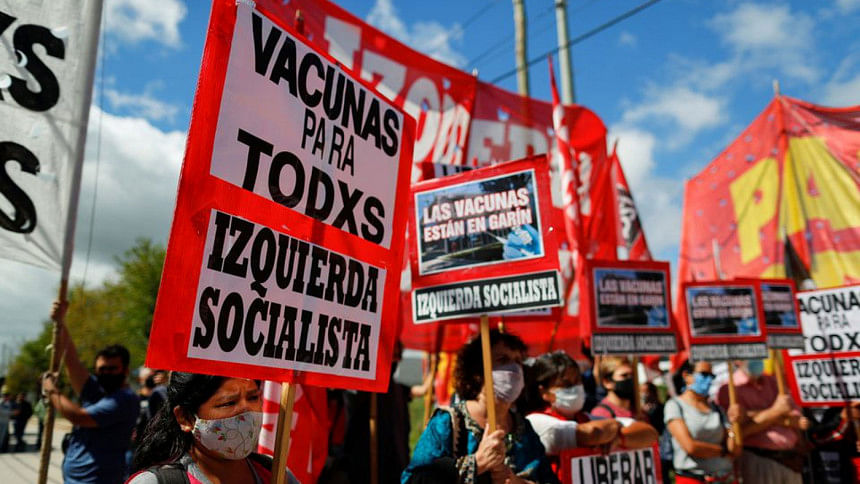The future of Covid-19 vaccines: Will there be a patent waiver?

As much of the world continues to reel under the coronavirus crisis, there is an increasingly frantic scramble for more and more vaccines in countries seeking to protect their people against the disease. One of the possible solutions to the vaccine crunch which is being talked about now, particularly in low and middle-income countries, is a temporary waiver of intellectual property rights for Covid-19 vaccines under the umbrella of the 164-member World Trade Organisation (WTO).
The patent waiver was proposed jointly by India and South Africa at the WTO in October last year to temporarily do away with the provision relating to not only vaccines but all Covid-related medicines and technologies under the agreement on Trade-Related Aspects of Intellectual Property Rights (TRIPS). Interestingly, there has been no mention as to how long the waiver should be in place. More than 100 countries have so far backed the waiver move.
Bangladesh, South Korea and Canada are among the countries which have expressed interest in the domestic manufacture of Covid vaccines if a patent waiver happens. In an important development, the Joe Biden administration in the United States has come out with support. This has been followed by a re-thinking on the part of waiver opponents like Japan, Australia, European Union, Germany, New Zealand and Canada, whose reservations against the waiver has held up any movement on the issue for months. Bangladesh has already shown interest in manufacturing foreign jabs in its own facilities. India too has offered to hold human trials of its indigenously-developed vaccine Covaxin and manufacture it in Bangladesh.
The text-based negotiations on the issue are expected to begin at the end of this month, and a lot depends on how the talks pan out for the simple reason that the devil always lies in the details in fine print. Secondly, the US has committed its support only to a patent waiver for Covid vaccines, rather than to all the virus-related technologies and testing material. Thirdly, several countries now backing the waiver may be prodded to change their stance at the time of the final negotiations at the WTO, where any country can veto the move. So, there are major hurdles still to be overcome.
There is a general consensus among developing countries that the TRIPS waiver on the Covid-19 vaccine is expected to open up considerable space for their production in other countries' own facilities. If the waiver is granted, countries like India, which has a proven track record of vaccine manufacturing, may stand to gain by locally producing vaccines like Pfizer and Moderna, which at present enjoy patent protection. This will also boost global supplies, particularly in developing and poor countries. It is believed that the patent waiver may allow broad-based production centres of vaccines like Moderna, Johnson & Johnson, Pfizer, Covaxin and Novavax, most of which are now manufactured in the developed world, by shifting some to middle-income countries.
As was expected, the multinational pharma lobby has swung into action, building up opinions against the patent waiver. It points out that the TRIPS Agreement already safeguards for public health emergencies, such as through the provision for exception to "government use" under adequate payment to the patent owner. The difference is that a waiver would do away with this provision. What the pharma companies point out is that out of the eight Covid vaccines authorised so far for emergency use in different countries, five, including Covishield of Oxford AstraZeneca, Covaxin of Bharat Biotech and Sputnik V, are already licensed or manufactured in India.
The pharma lobby also points out that a patent waiver does not guarantee expediting and increasing vaccine production in middle and low-income countries, which need to ramp up their own manufacturing facilities, an exercise that is time-consuming and does not happen overnight, particularly in those countries which are new to the sector. In an interview to Sky News, Microsoft founder Bill Gates, one of the critics of the patent waiver, suggested that many developing and poor countries do not have the manufacturing facilities required to churn out vaccines, and if vaccine technology is transferred to these countries, it has to happen with grants and technological assistance from developed countries.
The counter to the opponents of a patent waiver is that a country like India has a big and highly reliable generic (copycat) medicine production sector built up over decades, since the early 1970s, with the help of process patenting rather than product patenting. It was this that allowed a company like Cipla to manufacture HIV drugs in the 1990s in India and supply them to African countries. However, the TRIPS Agreement in 2005 forced India to switch to product patent.
The challenge is not merely that of scaling up vaccine production facilities. There is the issue of accessing critical raw materials and ingredients like plastic bags, filters and some mediums used in vaccines production, a problem that has been encountered by the Serum Institute of India while manufacturing Covishield, after the US invoked the American Defence Production Act to stop the export of the raw materials needed for manufacturing the vaccine. Many of the inputs that go into the manufacture of vaccines are also patent-safeguarded. Will the developed countries easily allow their commercial interests to be compromised for the sake of altruism in the race for vaccines?
Pallab Bhattacharya is a special correspondent of The Daily Star. He writes from New Delhi, India.

 For all latest news, follow The Daily Star's Google News channel.
For all latest news, follow The Daily Star's Google News channel. 



Comments